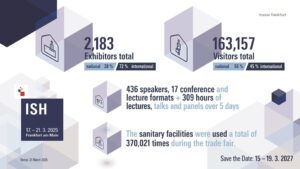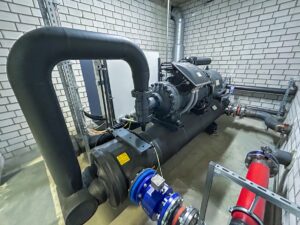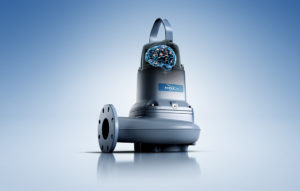2019 AHR Expo Showcases Excitement for HVACR, Global Market Expansion
The 2019 AHR Expo returned to Atlanta for the first time since 2001 and by all accounts the Show delivered. This year the Show floor exhibited 1,824 companies from across the entire industry, including 497 international exhibitors, bringing together the best in technology and product advancement. Throughout the three-day Show there was palpable energy felt for the future of HVACR among attendees and exhibitors alike.
“The HVACR industry is in a very exciting position at the moment and that energy was evident on the Show floor this year,” said Mark Stevens, show manager of AHR Expo. “Attendees came from all over the globe and from every corner of the industry to make this Show a success. We’ve received great feedback on the quality of networking from both attendees and exhibitors and look forward to seeing many of these connections come to life in the products and technologies on the Show floor in Orlando next year.”
2019 AHR Expo by the Numbers
This year the AHR Expo used radio-frequency identification (RFID) technology to verify attendance, which allows for the scanning in of each person without stalling the crowd and creating long wait times. This means that the Show was able to generate a true capture of every attendee that walked through the door, spent time on the exhibitor floor as well as in education sessions. In previous years the Show relied on pre-registration and on-site registration to quantify attendance. The 2019 numbers are strong, with a total verified attendance of 45,078.
“The planning of the Show has always been focused on creating the best experience for our exhibitors and attendees. We recognized the benefit of verifying attendees long before the technology allowed us to do it in a way that didn’t interrupt the experience we wanted to create for those who travel to be here,” said Stevens. “We want our attendees and exhibitors networking, capturing leads, learning, interacting and focused on their day rather than waiting at the gate to be scanned in. The new verified technology allows us to do just that.”
Education Program Highlights
The 2019 AHR Expo Education Program covered a broad range of topics in depth, providing insights for all AHR stakeholders into market trends, tips to building a business, energy savings, as well as industry best practices. Highlights from the Show include:
Smart home: Best opportunities research
Research unveiled at AHR Expo pinpointed the best course forward for smart home technology deployments. The upshot: multi-dwelling units (MDUs) remain underserved due to the varieties of end-user requirements. At the same time, they sit at the intersection of the single family — who benefits most from smart home innovation — and commercial buildings, sharing characteristics of each. Importantly, MDUs have the size to invest in new technology, a stronger connection to resident satisfaction and more direct involvement of senior management for investment decisions. This makes MDUs the sweet spot where smart home innovation and experimentation can take root. (Presenter: Continental Automated Buildings Association.)
Cybersecurity: Prioritize developing a defense in depth
A strong call to action kicked off this session, underscored by a roll call of blue-chip companies suffering billions in losses due to data breaches, including the $520 million Target breach famously caused by a compromised HVAC subcontractor’s PC and login credential. Attendees learned a step by step plan for developing a strong cybersecurity defense. Recommended best practices: separating network traffic for automation and control systems (ACS) from the internet and other operations; communications encryption and two-factor authentication for remote access; role-based access control limiting where people can go in the network; and integrating security and information and event management (SIEM) systems to help detect attacks as they happen before the damage is done. (Sponsor: BACnet International. Presenter: Schneider Electric.)
Contractors: Growing sales by saving customers money
This tutorial case study explained how to deliver energy savings, and sell additional services, by expanding balancing tests and remediation services. The highly detailed presentation showed how adding inexpensive tests provided additional diagnostics information that can help identify problems and create opportunities to sell correctional services. The results can improve actual system performance from 50% to 85% of rated and deliver valuable energy savings. (Sponsor: BACnet International. Presenter: Schneider Electric.)
Green cooling: Policy impact on natural refrigerants
The policy impact on driving markets to replace high global warming potential (GWP) HFCs is essential for change cannot be overstated. In the EU, for example, a 1,000% increase in prices for high GWP HFCs is prompting a move to natural refrigerants in supermarkets. As a result, of the 20,000 supermarkets and c-stores worldwide that use natural refrigerants, 16,000 are in Europe and 3,500 in Japan. Only 370 are installed in the U.S. Policy leaders in this area are the state of California, the EU and Japan. China is also getting on board and beginning to push natural refrigerants. (Presenter: shecco America)
Buildings and employees: How better buildings improve productivity and job satisfaction
New research presented at AHR Expo showed that building quality ranked second in contributing to employee satisfaction and productivity when benchmarked against other traditional employee perks such as bonuses, fitness benefits and flexible work hours. Only private work offices topped building quality by a slim margin. Since 80% of most organizations budget is spent on staff and 10% on buildings, spending more on providing a quality work building environment to get more loyalty and productivity from staff makes sense. (Presenter: Continental Automated Buildings Association.)
Green buildings and energy savings: Reducing Cooling Operating Costs by 40%
Two detailed post-installation case studies showed how both a 250- and a 500-ton closed circuit cooling tower chillers reduced energy consumption by 48%, lowered energy demand in peak periods and reduced annual operating costs. (Presenter: Cooling Technology Institute.)
Personal health: Indoor air quality for a healthy lifestyle
Surprisingly, air pollutants that can threaten your health are two to 10 times worse indoors than outdoors. The four most dangerous indoor pollutants are tobacco smoke, formaldehyde, radioactive Radon gas and particulate matter that if large enough, can directly enter the bloodstream and cause health problems. New IoT devices can help address these concerns and better protect people indoor with cost-effective sensors that monitor air quality and send alerts to homeowners. (Sponsor: Indoor Air Quality Association. Presenter: Refresh Smart Home.)
2019 Innovation Awards Product of the Year
The AHR Expo awarded its esteemed Product of the Year award for 2019 to enVerid Systems. enVerid was also recognized as the winner of the 2019 Innovations Awards Green Building category for its HVAC Load Reduction® (HLR) Module 1000E-M. Each year, winners are selected in a total of 10 industry categories. A ceremony hosted during the AHR Expo recognizes all winners from these categories and an overall Product of the Year winner is chosen.
“Being named Product of the Year is an enormous honor and extremely gratifying to our entire team,” said Dr. Udi Meirav, founder and president of enVerid Systems. “But even more importantly, it is a recognition of the transformative potential of HLR technology for the entire industry. We hope this will further encourage the industry to accelerate the adoption of HLR-based designs of HVAC systems and bring its phenomenal benefits to buildings all over the world.”
What’s Ahead for HVACR?
Industry trends that are expected to play a role in the coming year were discussed on the Show floor and in the Education Sessions. Among these are: alternative refrigerants; job force replenishment and recruiting into the HVACR industry; whole-building systems operations; and the Internet of Things and building automation control (BAC). Another topic of discussion was HVACR’s role in new markets, such as health and wellness, cloud-based systems and food production via controlled climates. Follow along with AHR Expo throughout the year to track these trends.
The next AHR Expo will be held February 3-5, 2020 in Orlando, Florida.
Source: International Exposition Co.






